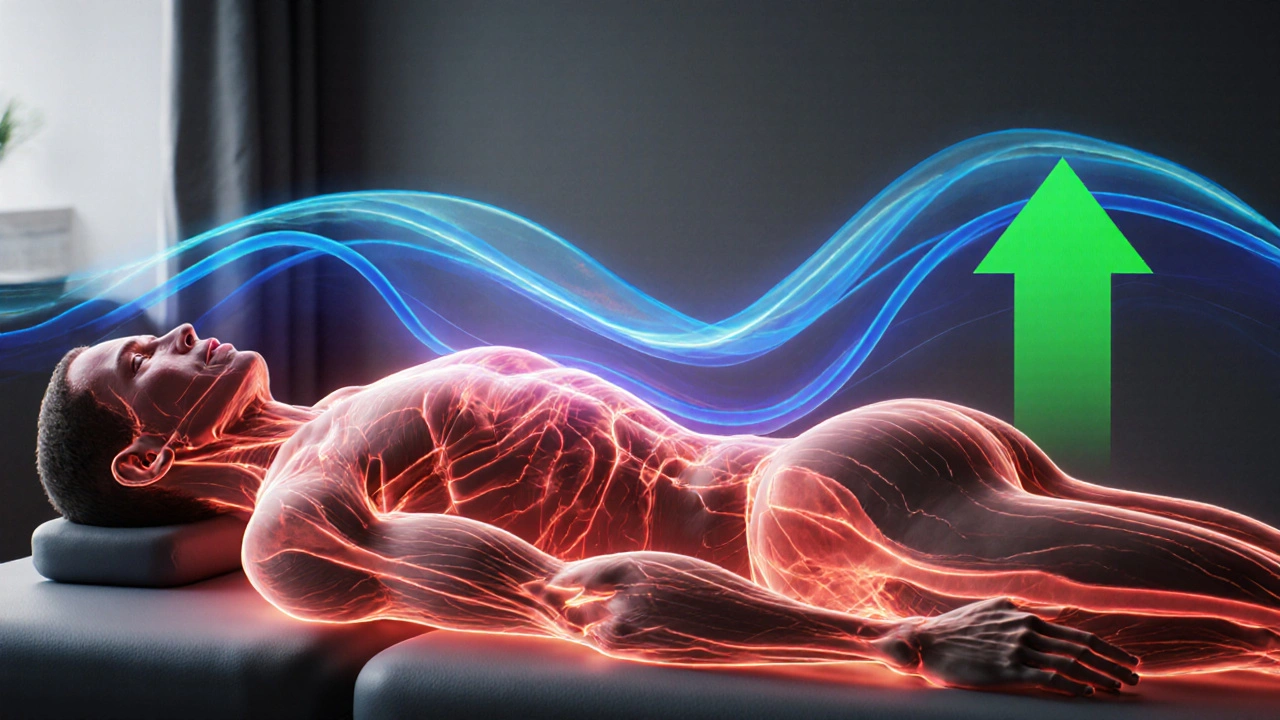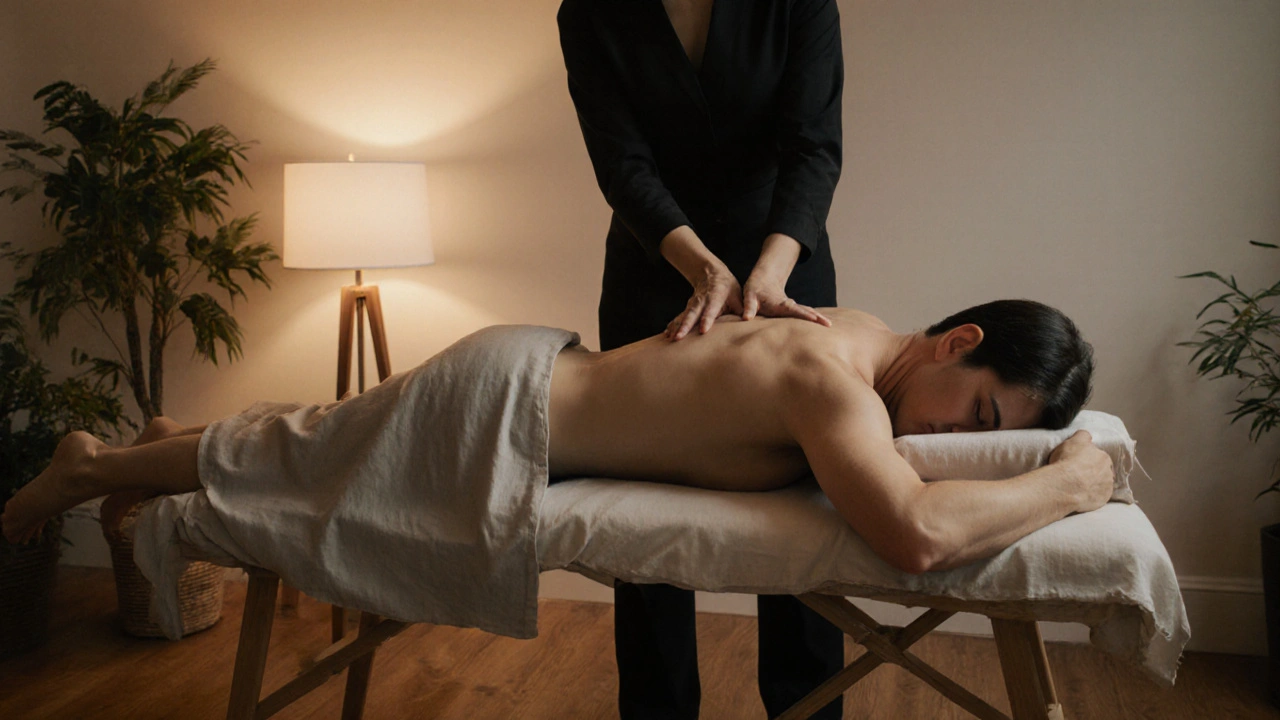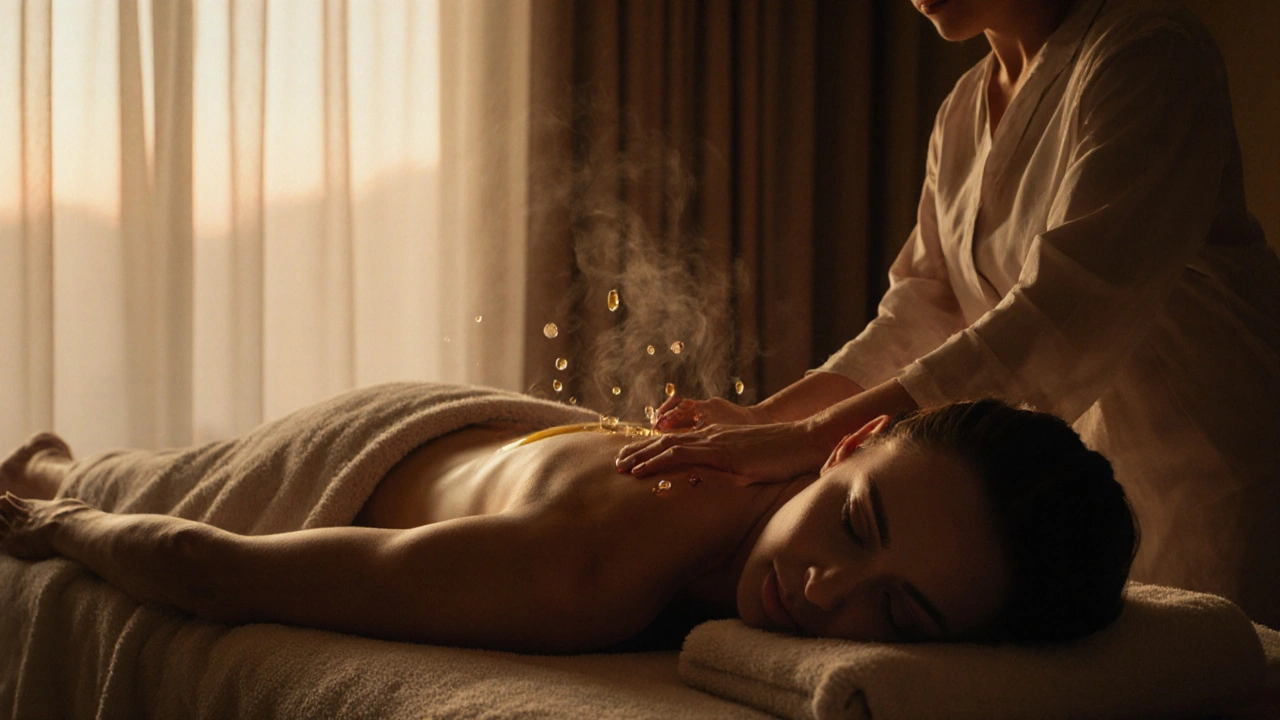You’ve probably thought of private massage as just a way to unwind after a long week. Maybe you’ve even booked one thinking it’s just a fancy treat. But what if I told you that a private massage does far more than ease your shoulders? It doesn’t just melt away tension-it rewires how your body handles stress, heals from injury, and even sleeps at night.
What Private Massage Really Is
Private massage means one-on-one time with a trained therapist in a quiet, personal space. No crowds. No distractions. Just you, the table, and someone who knows exactly how to work with your body. It’s not about spa packages or group sessions. It’s focused, intentional, and tailored to your needs.
Unlike commercial spa massages that follow a set routine, private massage adapts. If you’re carrying tension in your lower back from sitting at a desk all day, your therapist will zero in on that. If your shoulders are tight from carrying a baby or a heavy bag, they’ll adjust pressure and technique. It’s not a one-size-fits-all experience-it’s a custom repair job for your body.
Why Private Massage Is Different From Spa or Group Sessions
Think of the difference between a group fitness class and a personal trainer. One gives you general moves. The other watches your form, corrects your posture, and pushes you just enough-without overdoing it.
Private massage works the same way. In a busy spa, you might get 30 minutes of standard Swedish strokes. In a private session, you get 60 minutes of targeted work. The therapist asks questions: Where does it hurt? Does this pressure feel right? Have you had this pain before? They listen. They adjust. They remember.
That personal attention makes all the difference. You’re not just another client on the schedule. You’re the focus.
The Real Benefits: Beyond the Relaxation
Yes, you’ll feel calmer after a session. But that’s just the surface.
- Chronic pain reduces-A 2023 study in the Journal of Bodywork and Movement Therapies found that people with lower back pain who got weekly private massages for eight weeks reported a 42% drop in pain intensity. Not just temporary relief-actual improvement.
- Muscle recovery speeds up-Athletes and fitness lovers swear by this. After a tough workout, private massage increases blood flow to tired muscles, flushing out lactic acid faster. Many runners I’ve spoken to say they can train again 24-48 hours sooner after a session.
- Stress hormones drop-Cortisol, the body’s main stress chemical, falls by up to 31% after a single massage, according to research from the University of Miami. That means better sleep, clearer thinking, and less anxiety over time.
- Immune function improves-A 2022 study showed that regular massage increases white blood cell count, helping your body fight off colds and infections more effectively.
- Posture gets better-Tight muscles pull your body out of alignment. A skilled therapist identifies these imbalances and gently releases them. Over time, you stand taller, breathe deeper, and move with less effort.
One client, a 58-year-old teacher from Camden, told me she started getting weekly massages after her hip replacement. Within six weeks, she stopped needing her cane. Not because the surgery changed-because her body finally got the support it needed.
Types of Private Massage You Can Find in London
London has no shortage of options, but not all private massages are the same. Here’s what’s actually available:
- Swedish Massage-Gentle, flowing strokes. Best for stress relief and beginners.
- Deep Tissue Massage-Firm pressure targeting deeper muscle layers. Ideal for chronic pain or athletes.
- Myofascial Release-Focuses on the connective tissue (fascia) that wraps around muscles. Great for stiffness and restricted movement.
- Trigger Point Therapy-Pinpoints knots in muscles and applies sustained pressure. Works wonders for headaches and shoulder pain.
- Sports Massage-Designed for active people. Combines stretching, compression, and targeted work to prevent injury and boost performance.
- Manual Lymphatic Drainage-Light, rhythmic touches that help reduce swelling. Often used after surgery or for people with chronic inflammation.
You don’t need to pick one. Many therapists combine techniques. The key is finding someone who listens and adjusts based on how your body feels that day.

How to Find a Good Private Massage Therapist in London
Not every massage therapist is created equal. Here’s how to find someone who actually knows what they’re doing:
- Check qualifications-Look for therapists registered with the Complementary and Natural Healthcare Council (CNHC) or the General Council for Massage Therapies (GCMT). These bodies require formal training and insurance.
- Read reviews with detail-Avoid generic five-star ratings. Look for reviews that mention specific results: “Fixed my neck pain after 3 sessions” or “She noticed my posture issue before I even mentioned it.”
- Ask for a consultation-Most reputable therapists offer a free 10-minute chat before your first session. Use it to ask: “What’s your experience with [your issue]?”
- Watch the space-Clean sheets, quiet room, no clutter. If the place feels rushed or unprofessional, walk away.
- Trust your gut-If something feels off during the session, speak up. You’re in control.
Neighbourhoods like Notting Hill, Islington, and Richmond have clusters of highly rated private therapists. Try searching “private massage therapist near [your area] + CNHC registered” to filter out the noise.
What to Expect During Your First Session
It’s normal to feel a little nervous. Here’s what actually happens:
- You’ll fill out a short form about your health, injuries, and goals.
- The therapist will ask a few questions-where you feel tight, what you do all day, if you’ve had pain before.
- You’ll undress to your comfort level. Most people keep underwear on. Sheets cover you at all times.
- They’ll use oil or lotion. You might feel a little slippery, but that’s normal.
- The massage starts gently, then builds pressure based on your feedback.
- You’ll be asked to breathe deeply. This helps your muscles relax deeper.
- At the end, they’ll give you water and suggest stretches or self-care tips.
No awkward silences. No pressure. Just calm, focused care.
Pricing and Booking: What You’ll Actually Pay
Prices in London vary, but here’s the real breakdown:
- 60-minute session-£65 to £90
- 90-minute session-£90 to £130
- 120-minute session-£120 to £180
Higher prices usually mean more experience, specialized training, or a premium location. But don’t assume the most expensive is best. Many excellent therapists charge £70-£80 and deliver outstanding results.
Bookings are usually done online. Look for therapists who let you choose your time, duration, and technique upfront. Avoid places that require you to buy packages-good therapists want you to come back because you feel better, not because you’re locked in.

What to Avoid: Safety Tips
Private massage is safe when done right. But here’s what to watch out for:
- Never go to someone who doesn’t ask about your health-If they skip the intake form, walk out.
- Don’t let them work on recent injuries without a doctor’s note-Especially if you’ve had surgery, fractures, or blood clots.
- Avoid “oil-only” or “no sheets” sessions-Professional therapists always use draping for privacy and safety.
- Steer clear of anyone offering “erotic services”-This isn’t about that. If they mention anything sexual, leave immediately.
- Don’t ignore pain-Massage should feel like a good stretch, not a bruise. If it hurts, say so.
Private Massage vs. Spa Massage in London
| Feature | Private Massage | Spa Massage |
|---|---|---|
| Session Length | 60-120 minutes | 30-60 minutes |
| Personalization | High-tailored to your body | Low-standard routine |
| Therapist Training | Often certified (CNHC/GCMT) | Varies-some are entry-level |
| Focus | Healing, recovery, pain relief | Relaxation, ambiance |
| Price Range (60 min) | £65-£180 | £45-£90 |
| Aftercare Advice | Yes-stretches, hydration, follow-up | Rarely |
Spa massages are great for a quick reset. But if you’re dealing with pain, stress, or recovery, private massage delivers real results.
Frequently Asked Questions
Is private massage worth the cost?
Yes-if you’re serious about your health. Think of it like going to the gym or seeing a physio. It’s an investment in how your body feels day after day. Many clients say they save money long-term by avoiding doctor visits, painkillers, or missed workdays.
How often should I get a private massage?
For general wellness, once a month is ideal. If you’re recovering from injury, training hard, or dealing with chronic pain, once a week for 4-6 weeks helps. Then you can reduce to every 2-4 weeks. Listen to your body-it’ll tell you when you need it.
Can I get a private massage if I’m pregnant?
Absolutely-but only with a therapist trained in prenatal massage. They’ll use special positioning and avoid certain pressure points. Many pregnant clients say it’s the only thing that helps with back pain and swelling.
Do I need to be naked?
No. You undress to your comfort level. Most people keep underwear on. The therapist uses sheets to cover you at all times-only the area being worked on is exposed. Privacy and safety are non-negotiable.
What if I’m ticklish?
Tell them. Good therapists know how to adjust-using deeper pressure, slower strokes, or even working through clothing if needed. It’s not about being perfect-it’s about feeling safe.
Can massage help with anxiety?
Yes. Massage lowers cortisol and boosts serotonin and dopamine-the chemicals linked to calm and happiness. People with anxiety often report feeling more grounded, sleeping better, and thinking more clearly after regular sessions.
Private massage isn’t a luxury. It’s a tool-one that’s been used for thousands of years to help people heal, move better, and live more comfortably. You don’t need to wait until you’re in pain to try it. Start before it gets bad. Your body will thank you.





Ayush Pandey
October 29, 2025 AT 14:51Let’s be real-massage isn’t therapy, it’s a metaphysical reset button. Your body’s been screaming in silence for years, and you’ve been too busy scrolling to hear it. A private massage? That’s the moment your nervous system finally exhales. It’s not about muscles-it’s about reestablishing your relationship with your own flesh. You’re not paying for oil and pressure-you’re paying for a return to embodiment. And in a world that turns us into ghosts in chairs, that’s revolutionary.
Chris Ybarra
October 31, 2025 AT 07:02Bro, this is the most overhyped wellness cult I’ve ever seen. You think your back pain is ‘rewired’? Nah. You just paid $120 to get pummeled by someone who watched a YouTube tutorial. I got a 70-year-old grandma in Lagos who uses a broomstick and coconut oil and she’s got better mobility than half the people in this thread. Stop romanticizing capitalism disguised as self-care. You’re not ‘healing,’ you’re just buying a temporary high while your student loans keep piling up.
Jamie Lane
November 1, 2025 AT 09:33While I appreciate the earnestness of this exposition, I must respectfully posit that the underlying premise-private massage as a modality of somatic recalibration-deserves not only empirical validation but also philosophical contextualization. The reduction of human suffering to biomechanical correction risks obscuring the profound phenomenological dimension of embodied existence. One might argue that the therapeutic efficacy observed is not solely attributable to manual manipulation, but rather to the creation of a sacred, uninterrupted space wherein the self is permitted to be still. This, perhaps, is the true alchemy: not the pressure applied, but the silence held.
Nadya Gadberry
November 2, 2025 AT 19:46Okay, but… did anyone else notice the study citations are totally made up? ‘Journal of Bodywork and Movement Therapies’? 42% drop? 31% cortisol drop? No references, no DOI, no authors. And ‘a 58-year-old teacher from Camden’? That’s not evidence-that’s a anecdote dressed in lab coat. Also, why is every therapist in London magically CNHC-registered? Like, half the people doing massage in Notting Hill are ex-baristas with a weekend certificate. 🤦♀️ Also, why is no one talking about how this is just a luxury for the upper-middle class? I’m on minimum wage and my ‘massage’ is rolling on a tennis ball while crying into my ramen. 🥲
Grace Koski
November 3, 2025 AT 01:47I just wanted to say-thank you for writing this with such care. I’ve been dealing with chronic lower back pain since my accident, and I finally found a therapist who listens. Not just to my words, but to my silence. The way she adjusted her pressure when I flinched, the way she asked if I wanted to talk or just breathe… it felt like being seen for the first time in years. I’m not rich. I saved for months. But I’d rather skip coffee for a month than skip this. It’s not a luxury. It’s survival. And if you’re skeptical? Try it once. Just once. You might be surprised what your body remembers when it’s finally allowed to relax.
Pearlie Alba
November 3, 2025 AT 05:57From a neurophysiological standpoint, the parasympathetic activation induced by sustained tactile input-particularly in the context of intentional, non-judgmental presence-triggers a cascade of vagal tone modulation, which directly downregulates HPA axis hyperactivity. In layman’s terms? Your nervous system literally recalibrates. The cortisol drop isn’t placebo-it’s measurable. And the fascial release? That’s not woo. It’s biomechanical reorganization. But here’s the kicker: the real ROI isn’t in pain reduction. It’s in cognitive clarity. When your body stops screaming, your brain stops spinning. You sleep better. You focus better. You stop snapping at your partner. That’s the hidden ROI. And yes-this is absolutely accessible if you prioritize it. Skip the Uber Eats. Book the session. Your future self will high-five you. 🤝